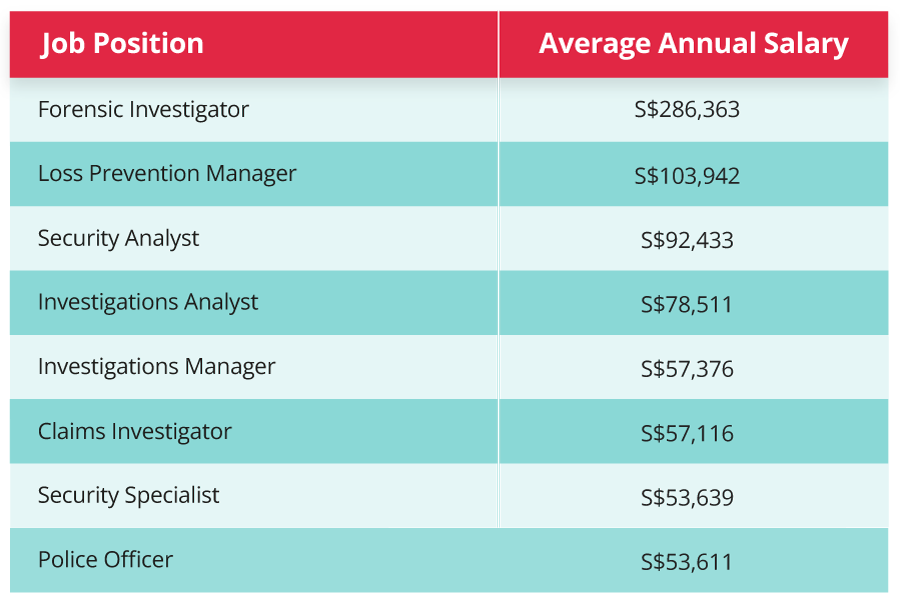
Criminology
Evidence-based learning for real-world challenges, preparing you for careers that protect and serve society.

Enjoy an Education Grant
of S$1,090 when you enrol2
Criminology
Criminology
Enjoy an Education Grant
of S$1,090 when you enrol2
Criminology is the study of crime, criminals, and how society responds to offending. In this discipline, you will learn about criminal law and how the state responds to crime through the criminal justice system.
You will explore policing, the history of crime, criminal behaviour, as well as international and transnational crime. The discipline takes a multidisciplinary approach, examining both the causes of crime and strategies for crime prevention.
You will also develop a strong understanding of key theories of crime, with a particular focus on criminal behaviour, international and transnational crime, and the historical development of crime and justice.
You will build your skills in presenting clear written and oral arguments in response to different perspectives on crime. In addition, you will be trained in research methods, including the use of statistics, so that you can critically evaluate evidence and adopt an evidence-based approach in your chosen field of work.
Top 5 Reasons to Choose Murdoch University
- Double Majors. Double the Advantage.
Gain in-depth expertise across two specialisations and stand out in today’s competitive job market. - Complete Your Double Major Degree
in 20 months1
Advance your education and step into your career with a strong competitive advantage. - Flexible Study Schedule3
Plan your own timetable and study at your own pace — perfect for busy learners. - Access Classes Anytime, Anywhere
Enjoy the convenience of recorded lectures and online learning resources available 24/7. - Full Degree Transcript Upon Completion
Upon completion, you will receive a full Degree transcript — a globally recognised record of achievement that reflects all the modules. This serves as your official proof of academic excellence, supporting your career advancement and further study opportunities.
Single & Double Majors Available
- Bachelor of Criminology in Criminal Behaviour
- Bachelor of Business in Accounting and Criminology
- Bachelor of Business in Banking and Criminology
- Bachelor of Information Technology in Cyber Security and Forensics and Criminology
- Bachelor of Business in Finance and Criminology
- Bachelor of Business in Human Resources Management and Criminology
- Bachelor of Business in Management and Criminology
- Bachelor of Psychology in Psychological Science and Criminology
Industry-Relevant Units
This Degree consists of 12 units (with exemptions) or 16 units. The following units are covered in the programme:
- Children and Crime
- Corrections
- Criminal Behaviour
- Culture, Diversity and Crime
- Forms of Violence
- Introduction to Psychological Research Methods
- Policing and Crime Prevention
- Psychology and Law
- Technology, Crime and Justice
- Building Employability Skills or Consulting and Freelancing
- Elective 1
- Elective 2
Duration & Intakes
Duration: 16 months1
Intakes: January, May & August
Accreditation & Ranking
- Top 2% Universities Worldwide5
- 5-star rating for Overall and Teaching, Employability, Innovation and Inclusiveness

Criminology in the Singapore Context
Singapore is widely recognised as one of the safest countries in the world. The Ministry of Home Affairs (MHA) reports that Singapore continues to rank among the top globally for “Order and Security”, with physical crime remaining low and recidivism rates among the lowest worldwide6.
Maintaining Singapore’s high level of safety requires constant effort and expertise, especially as the landscape becomes more complex6. Emerging challenges such as cybercrime, drug reoffending, family violence, and scams are growing increasingly sophisticated, making the task of keeping Singapore safe more demanding7. These issues demand professionals who can go beyond enforcement alone. Individuals who understand criminal behaviour, analyse crime data, evaluate policies, and design effective prevention and rehabilitation strategies.
This is where graduates with a Criminology Degree play a vital role. Trained in understanding the causes of crime and the workings of the criminal justice system, they contribute evidence-based insights that support law enforcement, corrections, social services, and community partners in keeping Singapore safe, resilient, and inclusive.
Where a Criminology Degree Can Take You
A Criminology Degree prepares you for diverse roles across the public and private sectors.
Law Enforcement & Investigation
Leverage your understanding of crime patterns and human behaviour in:
- Analytical and support roles within law enforcement agencies (e.g. operations, planning, intelligence, crime prevention, community engagement).
- Investigation-related work that benefits from strong research and interviewing skills.
While specialist uniformed roles (e.g. police officers) have their own recruitment and training pathways, a Criminology background strengthens your understanding of the Singapore Police Force’s (SPF) mission and environment.
Prisons, Rehabilitation & Aftercare
As SPF and Yellow Ribbon Singapore (YRSG) work to keep overall recidivism low and support reintegration, there is demand for people who understand correctional practice and desistance:
- Roles supporting rehabilitation programmes, skills training, and reintegration planning
- Aftercare and case management, working with ex-offenders and their families through community partners.
Your Criminology training helps you interpret recidivism statistics and design or deliver interventions that support change.
Community, Social & Youth Services
Crime is often linked to social issues such as family conflict, trauma, and marginalisation. Criminology graduates can contribute in:
- Non-Governmental Organisations and social service agencies supporting victims, offenders, and at-risk youth.
- Community safety, family violence, and preventive programmes.
With further professional qualifications (e.g. social work, counselling), Criminology graduates can move into more specialised practice roles.
Risk, Compliance & Corporate Security
In a global financial and business hub like Singapore, organisations must manage cyber risk, fraud, internal misconduct, and money-laundering:
- Corporate security, investigations, and fraud detection.
- Governance, ethics, and policy roles that require understanding of law, regulation, and human behaviour.
- Risk and compliance functions in banks, fintechs, and regulated industries.
- Your ability to read regulations, assess risk, and interpret behavioural patterns is highly transferable.
Policy, Research & Further Study
Criminology is a strong base for research and policy careers:
- Research roles in think tanks, universities, public agencies, or non-profits working on safety, security, and social issues.
- Policy analysis and programme evaluation, using official data from MHA, SPS, YRSG, and other agencies to assess what works.
- Postgraduate pathways in Law, Public Policy, Social Work, Psychology, or Specialised Criminal Justice Programmes in Singapore or overseas.
Is a Criminology Degree Right for You?
A Criminology Degree is designed for individuals who want to understand crime, justice, and social issues, and apply this knowledge to make a real difference in society.
This programme may be right for you if you are:
- Students and National Servicemen who are interested in contributing to Singapore’s safety, security, and social cohesion.
- Working adults in security, enforcement, social services, or related sectors who want a formal, locally relevant qualification.
- Mid-career professionals seeking meaningful roles in public service or community-focused organisations.
Attributes to have:
- Curiosity about why people offend – and how they stop.
- Comfort dealing with sensitive topics and ethical dilemmas.
- Commitment to evidence-based practice rather than stereotypes.
- Interest in working with diverse communities, including those facing stigma.
What You Will Learn
- Apply knowledge and skill that recognise diversity and the rights and perspectives of others in various contexts through independent enquiry.
- Analyse critically the contemporary research findings to produce evidence-based conclusions.
- Communicate in a manner consistent with the norms of criminology for a range of audiences.
- Distinguish between various types of international and transnational crime utilising relevant legal and policy dimensions.
- Explain the causes, interventions, and prevention of criminal behaviour from historical, legal, psychological, and sociological perspectives.
Tuition Fee
The total tuition fee covers university registration, lectures/tutorials/workshops and main assessments such as assignments/tests/examinations/projects (where applicable), programme materials in digital format, Degree (if earned) and transcript.
S$22,246.90 inclusive of GST, payable in 4 instalments
(12 units with exemptions)
S$29,484.50 inclusive of GST, payable in 4 instalments
(16 units)
Career Opportunities & Salary Guide
This programme equips graduates with practical skills for careers in criminal justice, investigations, and security. With a strong focus on law enforcement practices and community safety, graduates are prepared for roles across both private organisations and public agencies.

Source: Indeed (accurate as of January 2026)
Enquire Now
Contact Our Consultant

Refer Your Friend
Do you have a friend who is looking to advance their career? Share your study experience and encourage them to take the next step in their professional development.
They can gain access to quality education, and you will be rewarded for helping them achieve their career aspirations.
For every friend you refer who successfully enrols, you will receive a S$1,000 Referral Incentive8. There is no limit – the more you refer, the more you earn!

- Applicants with a Polytechnic Diploma may be exempted from up to 12 units and can gain entry to Year 2 of the programme. Applicants with a Murdoch University-recognised Kaplan Diploma or a private Diploma may be exempted from up to 8 units and can also gain entry to Year 2 of the programme. Instead of 28 to 36 months, depending on the programme/major chosen and if students follow the recommended study plan
- Applicable to 2026 intakes (Education Grant Terms & Conditions)
- Programme duration may be extended for students who take a lesser study load each term
- 3-year Polytechnic Diploma holders are exempted, subject to University’s approval.
- Murdoch University. QS World University Rankings 2026 & Webometrics
- Singapore Public Sector Outcomes Review 2024
- Channel NewsAsia article dated 11 February 2025
- Terms and conditions apply
Accreditations remain subject to accreditation providers. Kaplan Higher Education Academy is not responsible for any changes in accreditation requirements or loss of accreditation status not attributable to
Kaplan Higher Education Academy.
The information on this website is correct as of January 2026.